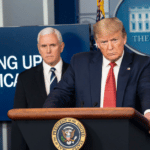





In a significant legal setback, the Manhattan District Attorney’s Office has successfully opposed former President Donald Trump's attempt to move his hush-money litigation to a federal court.
Law And Crime reported that the case will remain in state jurisdiction following the Second Circuit's review of Trump's appeal, which contested the necessity of a transfer based on presidential immunity claims.
The drama unfolded as Manhattan DA Alvin Bragg countered Trump’s request the day before the Second Circuit panel was scheduled to examine the stay associated with Trump’s motion. The stakes are high as this legal maneuvering is pivotal for Trump’s defense strategy.
The request by Trump’s team aimed to halt the state proceedings, arguing that the case infringed on matters of presidential immunity and should thus be considered at the federal level.
However, the initial sentencing date set for September 18 has now been postponed until the post-2024 election, minimizing immediate consequences for Trump.
Senior U.S. District Judge Alvin Hellerstein previously denied Trump's removal notice, stating that the case did not fall under federal jurisdiction and was irrelevant to claims of presidential immunity as it involved unofficial acts.
Following Judge Hellerstein’s decision, Trump's legal team quickly appealed, seeking a reconsideration that would prevent any incarceration until their arguments on presidential immunity could be fully litigated. This appeal led to the scheduling of a review by the Second Circuit for after 10 a.m. on a Tuesday.
On the eve of this critical review, DA Bragg submitted a detailed statement outlining the reasons for denying Trump’s request for a transfer. Bragg highlighted the procedural missteps by Trump’s defense, notably the failure to file a timely notice of removal, which was a key factor in the district court’s decision.
DA Bragg’s filing emphasized that the stay Trump sought was legally unfeasible and unnecessary, given the adjournment of sentencing. This point underscores the legal intricacies that often determine the trajectory of high-profile litigation.
The prosecution also addressed potential impacts of the Supreme Court’s recent decisions on the case. They argued that even if certain evidence were excluded, it would not undermine the overwhelming evidence supporting the verdict. This assertion points to a robust body of evidence that still implicates Trump, despite the legal arguments presented by his defense.
Bragg’s statement further contested the necessity of a new trial or a dismissal of the charges, arguing that the existing evidence suffices to uphold the verdict regardless of the disputed evidence.
The DA’s office has advised that challenges to the guilty verdicts be resolved within the state trial court and appellate systems, suggesting a procedural path forward for Trump’s ongoing legal battles.
In his comments to the court, Bragg stated that the requested stay was not only legally unavailable but also redundant in light of the postponement of sentencing. This stance reflects a strategic effort by the Manhattan DA’s office to maintain jurisdiction over the case amidst attempts to shift it to the federal system.
Bragg also criticized the mischaracterization of the appeal by Trump’s team and clarified the limited scope of the district court’s ruling, which only denied Trump the ability to file a belated notice of removal.
The denial of the request for a stay by the district court, as Bragg pointed out, does not affect the state court’s ruling on Trump’s post-trial immunity motion or the sentencing itself, which has been deferred.
Highlighting the separation of powers and jurisdictional integrity, Bragg noted the improbability of Trump facing sentencing or incarceration during the critical weeks of the presidential election, especially as early voting was underway.
This legal assertion positions the Manhattan DA’s office as a key player in the broader narrative of Trump’s legal challenges during his 2024 presidential campaign.
In conclusion, Bragg’s firm stance against the transfer to federal court underlines the ongoing legal struggles faced by Trump and represents a significant moment in the trajectory of this high-profile case.



